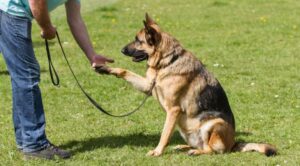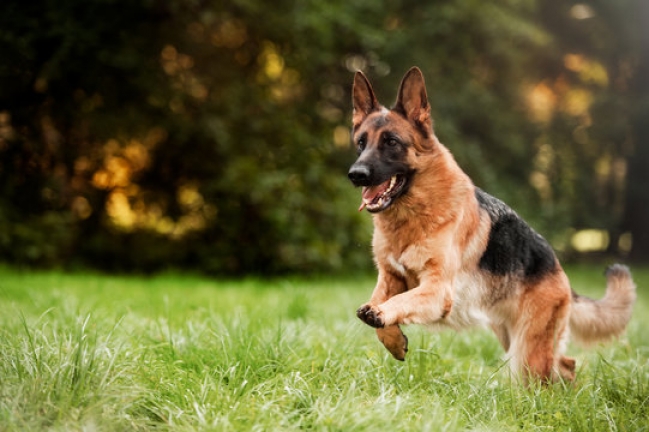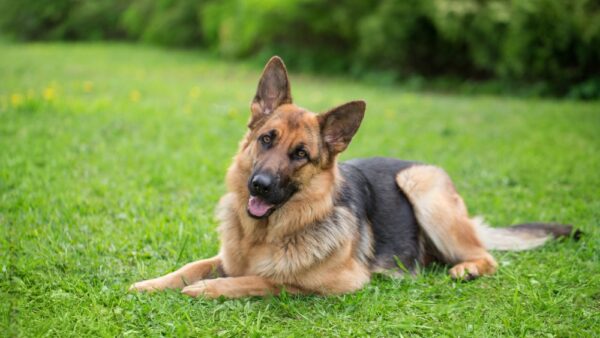Sitting pretty among the top three most popular dog breeds in the world is the German Shepherd. These dogs are known for their courage, loyalty, ability to learn, confidence and willingness to protect their people from potential harm.
These characteristics are what made a lot of people to view German Shepherds as indestructible. But are they truly indestructible? The truth is GSDs embodies bold personalities, but there is still a chink in their armor. Unfortunately, these dogs are very prone to having anxiety issues.
While anxiety in dogs is normal and considered a healthy emotion, it can lead to behavioral issues if left unchecked.
In this blog post, we have revealed all you need to know about German Shepherds anxiety symptoms. We have also provided a well-researched and enlightening answers to the following questions (What are German Shepherds anxiety symptoms? How to treat GSD anxiety? What are the Causes of Anxiety in German Shepherds and how to easily Prevent them?)
Not to waste a lot of time, let’s delve into the blog post!
Understanding Anxiety in German Shepherds
Before delving into the anxiety symptoms, let’s discuss what anxiety itself means. Anxiety is a natural response to stress or perceived threats, characterized by feelings of unease, apprehension, and heightened alertness.
According to ASPCA, German Shepherds’ anxiety manifests in different ways, it may be excessive barking, pacing, digging, destructive chewing, trying to escape or them becoming a bit withdrawn.
Anxiety affects the overall quality of dog’s life if left unchecked. Hence, as a responsible pet owner, it is important to help manage your dog anxiety immediately you notice the signs.
Causes of Anxiety in German Shepherds

Anxiety is very common in dogs. Judging from an evolutionary point of view, anxiety is an instinctual behavior in dogs.
Before domestication while dogs lived in the wild, they are always anxious and vigilant against perceived threats. Dogs that felt fear were also more alert, and this helped them live longer.
Aside from this, German Shepherds anxiety can be caused by other factors including fear, separation and aging.
Fear-related Anxiety: Fear of specific objects, situations, or experiences can lead to anxiety in German Shepherd. Common fears include thunderstorms, new environments, fireworks, or certain noises. These fears can result in anxious behaviors like trembling, hiding, or seeking comfort from you.
Separation Anxiety: Separation anxiety occurs when your dog is unable to find comfort when they are away from you. Take for example, you own a GSD and due to busy work schedule or some other factors, you spend little or no time with your dog anymore. The incredibly smart and loyal German Shepherd which is already attached to you will develop separation anxiety due to the fact that you are not available like before.
Age-related Anxiety: This form of anxiety is associated with Cognitive Dysfunction Syndrome (CDS). When dogs become old, their learning ability, memory, awareness, and mobility starts to decline, leading to confusion and anxiety.
How Do You Know your German Shepherd is Suffering from Anxiety
It is very easy to tell when your German Shepherd dog is suffering from anxiety. Below are the common anxiety symptoms in German Shepherds:
- Aggression
- Destructive behavior
- Drooling
- Excessive Barking
- Excessive panting
- Hiding
- Loss of Appetite
- Restlessness
- Shaking or Trembling
- Urinating or Defecating in the house.
Among the listed anxiety symptoms in German Shepherds, aggression stands out as one of the most dangerous indicators. Excessive barking, urinating and defecating are common indicators of separation anxiety.
If any of these signs are left unchecked, it can escalate into destructive behaviors, such as chewing on doorways and furniture. In fact, anxiety can drive your German Shepherd to damage your home as a coping mechanism.
Best Treatments for Dog Anxiety

The key to helping your anxious German Shepherd is to identify the triggers of their anxiety and provide them with the necessary support and solutions.
Identifying what’s causing your German Shepherd’s anxiety can be tricky to figure out by yourself. That’s why we strongly recommend taking your furry friend to a trusted veterinarian for a comprehensive examination.
Vets are experts at examining dogs, they can figure out what kind of anxiety your dog has and its potential triggers. They will also help to check if your German Shepherd’s anxiety is linked to any underlying health issue.
Below is the common treatment plan recommended by veterinarians to treat dog anxiety:
Using CBD Oil
Over the years, CBD oil has been used by human to cure their anxieties. Many pet owners believes that this oil can also help relieve dog anxiety.
CBD is a chemical compound found in hemp and cannabis. This harmless compound has relieving effect and many pet owners has attested to this compound’s efficacy.
According to a poll made by cannanine.com, 67% of dog owners who voted claimed that CBD oil helped to cure their dog’s anxiety.
However, CBD oil is yet to be regulated by the Government. Hence, if you are looking forward to treating your dog with this oil, it is best to consult with you vet first.
Counterconditioning and Desensitization
counterconditioning is a powerful tool when it comes to helping dogs overcome anxiety. This technique involves changing your dog’s emotional response to the things that trigger their anxiety. It’s like rewiring their brain to associate these triggers with positive experiences.
Here’s how it works: When your dog encounters something that usually makes them anxious, such as thunderstorms or strangers, you cuddle them or reward them with something they really like, like treats or playtime. This positive reinforcement teaches your dog to view those anxiety triggers as something good rather than something to fear.
Desensitization on the other hand is another effective technique to treat dog anxiety. It’s all about gradually exposing your dog to their anxiety triggers in a controlled and gentle way.
Let’s say your dog is scared of car rides. To desensitize them, you start by simply sitting in the car with them without even starting the engine. The idea is to get your dog used to the car as a non-threatening environment. Over several days or weeks, you slowly progress to short rides around the block and then longer trips. Throughout this process, your dog learns that the car isn’t something to be scared of.
Herbal Supplements and Remedies
There are many herbal supplements that works for dog anxiety, some of them contain calming herbs like ginger root, valerian root, chamomile, lavender and passionflower. All these herbs are palatable and they all possess calming properties.
Before opting for this natural approach, consult with your veterinarian to ensure it’s safe and appropriate for your dog’s specific needs.
Promoting Relaxation Through Aromatherapy
Another interesting approach to treat German Shepherd’s anxiety is Aromatherapy. Certain scents, like lavender and chamomile, can have a calming effect on dogs, just as they do on humans. You can use essential oils or specially designed dog-friendly aromatherapy products to create a soothing atmosphere for your furry friend.
The idea is to introduce the calming scents of these essential oils into your dog’s environment. You can do this by using a diffuser. You may also add drops of the essential oil to their bedding, or even gently massaging them with the oil.
For those that are new to this method, you may check out this 10-aromatherapy recipe for dogs suffering from anxiety.
Medications
This is mostly used for serious anxiety disorder. Vets usually recommend SSRIs and antidepressants like fluoxetine and clomipramine for treating severe anxiety disorder.
For mild anxiety caused by loud noise, thunderstorm or environmental change, your vet may recommend drugs like benzodiazepine alongside an antidepressant.
Preventing Anxiety in German Shepherds

I believe we all know the popular saying “Prevention is better than cure”. Determining the cause of your dog’s anxiety and how to treat it can be a very difficult thing to do. However, by taking the necessary preventive measures, you can make your German Shepherd less prone to having anxiety.
Below are the ways to help your German Shepherd avoid any anxiety related issue:
Early Socialization and Exposure
Socializing your dog properly during puppyhood can go a long way in shaping his personalities. As a responsible dog owner, you should always take your puppy to a park or gathering where he can interact with other dogs, pets and people. By doing this, your dog will become a well-adjusted canine citizen and he won’t be anxious anytime he’s around new people or pets.
Providing Mental and Physical Stimulation
Regular exercise doesn’t only help your dog physically, it goes as far as stimulating your dog mentally. A well mental stimulated dog will rarely pick up destructive or aggressive behavior.
Creating a Supportive Environment
Dog anxiety can be caused by environmental change or presence of stressors in the environment. Hence, to prevent anxiety stemming from environmental issues, create a safe and comfortable environment for your dog.
Inspect the environment and remove any stressor that can ignite anxiety in your dog.
Obedience Training
Obedience training plays an important role in preventing anxiety in German Shepherds. When dogs are well-trained, they gain confidence and a sense of security.
Unlike using aversion or shock collars to train dogs, obedience training focuses on providing mental stimulation and reducing boredom in your dog, both of which can be anxiety triggers.
Aside from that, obedience training helps to build a strong relationship between dog owners and their dogs. This connection can provide emotional support and comfort, helping your German Shepherd feel more secure and less prone to anxiety.
Conclusion
Many people believe that German Shepherds are indestructible due to their reputation for being strong, confident and capable dogs. However, like all other breeds, German Shepherds have their vulnerabilities and one of them is anxiety issues.
As a responsible GSD owner, it is important to know the anxiety symptoms in German Shepherds so as to attend to it promptly because leaving this behavior unchecked can lead to aggression or destructive behavior.
You can also treat your German Shepherd’s anxiety issues by following any of the effective treatments stated in this blog post (Using CBD oil, Herbal supplements, counterconditioning and desensitization etc.)







Leave a comment